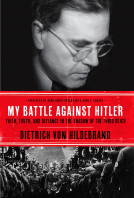Reviewed for NetGalley.
* * * * *
My Battle Against Hitler, by Dietrich von Hildebrand and John Henry Crosby, was for me a bit of a stroll down memory lane. Back in my college days, I studied philosophy. I probably read some von Hildebrand in those days, though truth to tell, I do not recall for certain. At any rate, I appreciated the opportunity to read about his life in these pages, and the things he did to circumvent the propaganda of Hitler’s Third Reich.
Choosing exile to remain safe when the Nazi’s took power, von Hildebrand wrote extensively about the evils of the Nazi ideology. Much of the information in My Battle Against Hitler came from his 5000 page memoir—which he never intended to be published. Yet those writing set the stage for his story, as told by John Henry Crosby. Following it, are excerpts from some of von Hildebrand’s materials that were published in a variety of places over the years.
One of the things I found most interesting is that while von Hildebrand came from a family that considered “religion” only insofar as it might be represented in beautiful works of art, he showed signs of his personal belief and commitment to God from as early as the age of five. Eventually, he became a serious member of the Catholic Church and was highly influential in that community. Deemed a “personalist,” in accordance with which his philosophical thought centered around questions of human existence and the dignity of man, von Hildebrand focused much of his commentary on the evils of the Nazi ‘s, who stood opposed to the interests of the individual man.
For those looking for a unique perspective of the Nazi days, and for those who enjoy a good philosophical argument, I highly recommend My Battle Against Hitler.
* * * * *
My Battle Against Hitler, by Dietrich von Hildebrand and John Henry Crosby, was for me a bit of a stroll down memory lane. Back in my college days, I studied philosophy. I probably read some von Hildebrand in those days, though truth to tell, I do not recall for certain. At any rate, I appreciated the opportunity to read about his life in these pages, and the things he did to circumvent the propaganda of Hitler’s Third Reich.
Choosing exile to remain safe when the Nazi’s took power, von Hildebrand wrote extensively about the evils of the Nazi ideology. Much of the information in My Battle Against Hitler came from his 5000 page memoir—which he never intended to be published. Yet those writing set the stage for his story, as told by John Henry Crosby. Following it, are excerpts from some of von Hildebrand’s materials that were published in a variety of places over the years.
One of the things I found most interesting is that while von Hildebrand came from a family that considered “religion” only insofar as it might be represented in beautiful works of art, he showed signs of his personal belief and commitment to God from as early as the age of five. Eventually, he became a serious member of the Catholic Church and was highly influential in that community. Deemed a “personalist,” in accordance with which his philosophical thought centered around questions of human existence and the dignity of man, von Hildebrand focused much of his commentary on the evils of the Nazi ‘s, who stood opposed to the interests of the individual man.
For those looking for a unique perspective of the Nazi days, and for those who enjoy a good philosophical argument, I highly recommend My Battle Against Hitler.



